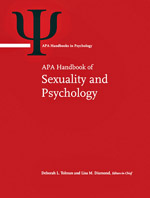Lisa Diamond, Ph.D.
Research Interests
My research focuses on sexuality, gender, and intimate relationships, and their implications for health and well-being over the life course. My primary research areas include (1) fluidity in sexual and gender expression among women and men, (2) biological underpinnings of sexual desire and experience, (3) the impact of early-life adversity on social and sexual development, and (4) the implications of sexual well-being for physical and mental health. In addressing these questions, I use a diverse range of research methods, including longitudinal observation across multiple time spans, controlled laboratory experiments, and collection of biomarkers (such as oxytocin, cortisol, and markers of systemic inflammation).
Education
Ph.D., Cornell University (Human Development, 1999)
B.A., University of Chicago (Psychology, 1993)
Selected Publications
Diamond, L. M. & Alley, J. C. (2022). Rethinking minority stress: A social safety perspective on the health effects of stigma in sexually-diverse and gender-diverse populations. Neuroscience & Biobehavioral Reviews, 104720. Download
Diamond, L. M., Dickenson, J. A., Blair, K. L. (2022). Menstrual-cycle changes in daily sexual motivation and behavior among sexually-diverse cisgender women. Archives of Sexual Behavior, 51, 577-588. Download
Alley, J. C., Jenkins, V., Diamond, L. M., & Everett, B. (2022). Understanding the link between adolescent same-gender contact and unintended pregnancy: The role of early adversity and sexual risk behavior. Archives of Sexual Behavior. Download
Alley, J. C. and Diamond, L. M. (2021). Early childhood adversity and women’s sexual behavior: The role of sensitivity to sexual reward. Developmental Review, 61, 100982. Download
Diamond, L. M., Dehlin, A., & Alley, J. C. (2021). Systemic inflammation as a driver of health disparities among sexually-diverse and gender-diverse individuals. Psychoneuroendocrinology, 129, 105215. Download
Diamond, L. M. (2021). The new genetic evidence on same-gender sexuality: Implications for sexual fluidity and multiple forms of sexual diversity. Journal of Sex Research, 58, 818-837. Download
Dickenson, J. A., Diamond, L. M., King, J. B., Jenson, K., Anderson, J. S. (2020). Understanding heterosexual women’s erotic flexibility: The role of attention in neural responses and sexual evaluations of sexual stimuli. Social Cognitive and Affective Neuroscience, 15, 447-465. Download
Diamond, L. M., Alley, J. C., Dickenson, J. A., Blair, K. L. (2020). Who counts as sexually fluid? Comparing four different types of sexual fluidity in women. Archives of Sexual Behavior, 49, 2389-2403. Download
Alley, J. C., Diamond, L. M., Dickenson, J. A., Blair, K. L. (2020). Women’s cortisol stress responsivity, sexual arousability, and sexual history. Archives of Sexual Behavior, 49, 1489-1503. Download
Diamond, L. M. (2020). Gender fluidity and nonbinary gender identities among children and adolescents. Child Development Perspectives, 14, 110-115. Download
Dickenson, J. A., Alley, J. C., Diamond, L. M. (2019). Subjective and oxytocinergic responses to mindfulness are associated with subjective and oxytocinergic responses to sexual arousal. Frontiers in Psychology: Health Psychology, 10, 1-13. Download
Alley, J., Diamond, L. M., Lipschitz, D. L., & Grewen, K. (2019). Associations between oxytocin and cortisol reactivity and recovery in response to psychological stress and sexual arousal. Psychoneuroendocrinology, 106, 47-56. Download
Diamond, L. M. & Alley, J. (2019). Was it good for her? An alternative perspective on life history theory, female same-sex sexuality, and pleasure. Archives of Sexual Behavior, 48, 1315-1320. Download
Diamond, L. M., Dickenson, J., & Blair, K. (2017). Stability of sexual attractions across different time scales: The roles of bisexuality and gender. Archives of Sexual Behavior, 46, 193-204. Download
Diamond, L. M. (2017). Wanting women: Sex, gender, and the specificity of sexual arousal. Archives of Sexual Behavior, 46, 1181-1185. Download
Diamond, L. M. (2016). Sexual fluidity in males and females. Current Sexual Health Reports, 8, 249-256. Download
Diamond, L. M. & Rosky, C. (2016). Scrutinizing “immutability”: Research on sexual orientation and its role in legal advocacy for the rights of sexual minorities rights? Journal of Sex Research, 53, 363-391. Download
Diamond, L. M. (2016). Three critical questions for future research on lesbian relationships. Journal of Lesbian Studies, 21, 1-14. Download
Diamond, L. M. (2012). The desire disorder in research on sexual orientation in women: Contributions of dynamical systems theory. Archives of Sexual Behavior, 41, 73-83. Download
Diamond, L. M., Hicks, A. M., & Otter-Henderson, K. D. (2011). Individual differences in vagal regulation moderate associations betweeen daily affect and daily couple interactions. Personality and Social Psychology Bulletin, 37, 731-744. Download
Diamond, L. M. & Wallen, K. (2011). Sexual-minority women's sexual motivation around the time of ovulation. Archives of Sexual Behavior, 40, 237-246. Download
Diamond, L.M., Fagundes, C. P., & Cribbet, M. R. (2012). Individual differences in adolescent sympathetic and parasympathetic functioning moderate associations between family environment and psychosocial adjustment. Developmental Psychology. Download
Diamond, L. M. (2008). Female bisexuality from adolescence to adulthood: Results from a 10-year longitudinal study. Developmental Psychology, 44, 5-14. Download
Diamond, L. M., & Dickenson, J. (2012). The neuroimaging of love and desire: Review and future directions. Clinical Neuropsychiatry, 9, 39-46. Download
Diamond, L. M., Hicks, A. M., and Otter-Henderson, K. D. (2008). Every time you go away: Changes in affect, behavior, and physiology associated with travel-related separations from romantic partners. Journal of Personality and Social Psychology,95, 385-403. Download
My Current Graduate Students
Raven Burton
Angel Villicana
Katie Wyant-Stein



